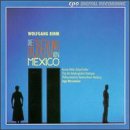| All Artists: Wolfgang Rihm, Ingo Metzmacher, Hamburg State Philharmonic Orchestra, Georg Becker, Renate Behle, Hans Joachim Frey, Carmen Fugiss, Peter Kollek, Susanne Otto, Richard Salter Title: Wolfgang Rihm: Die Eroberung von Mexico Members Wishing: 0 Total Copies: 0 Label: Cpo Records Release Date: 1/25/1995 Genre: Classical Style: Opera & Classical Vocal Number of Discs: 2 SwapaCD Credits: 2 UPC: 761203918522 |
Search - Wolfgang Rihm, Ingo Metzmacher, Hamburg State Philharmonic Orchestra :: Wolfgang Rihm: Die Eroberung von Mexico
 | Wolfgang Rihm, Ingo Metzmacher, Hamburg State Philharmonic Orchestra Wolfgang Rihm: Die Eroberung von Mexico Genre: Classical
|
Larger Image |
CD DetailsSimilar CDs |
CD ReviewsDizzingly original and powerful Karl Henzy | 01/08/1999 (5 out of 5 stars) "Along with Tan Dun's Marco Polo, Rihm's Conquest of Mexico is flat-our the most amazing opera since Ligeti's Le Grand Macabre. From the opening drum fugue, interspersed with shattering bursts from the chorus, to the beautiful duet at the conclusion, the music is dazzling--incredibly inventive at every step, now piercingly beautiful, now knock your head off powerful. Rihm, I think, has been an uneven composer in his career--a number of his works are so so (though not his 5th String Quartet: that's blistering). But in this work he put it all together and even transcended himself. Intriguing text by Antonin Artaud--really a set of plans for a play rather than actual dialogue. But it doesn't matter--Rihm's most powerful moments are shouts, cries, sighs, all visceral sound-moments. Wow." A failed modern opera R. Hutchinson | a world ruled by fossil fuels and fossil minds | 12/20/2004 (2 out of 5 stars) "DIE EROBERUNG VON MEXICO (THE CONQUEST OF MEXICO) is an ambitious attempt to stage Artaud's drama as an opera. The concept is questionable -- Artaud takes the historic narrative of Montezuma and Cortez and overlays it with a metaphysical confrontation between male and female, treated as mutually incomprehensible opposites doomed to a tragic denouement. Rihm adds an Octavio Paz text and tragic 16th century poetry by an anonymous indigenous Mexican writer to create an even more unwieldy edifice. Rihm's opera was first staged in 1992 to coincide with the 500-year anniversary of Colombus's voyage and the Spanish conquest. Artaud's twist, which Rihm follows, is to portray not a conquest but the mutual ruin of the antagonists, a metaphysical view with no basis in material history. Given the powerful elements of the drama, Rihm's music is strangely subdued, even enervating. The lead roles of Cortez and Montezuma are given periodically moving passages (Montezuma's role is sung by a soprano and an alto, as he embodies the female principle), culminating in the work's best moment at the very end as they sing a tragic duet, but the orchestral accompaniment is uniformly uninvolving. For an open-eared listener interested in Rihm, I would recommend his set of four concertos on Hanssler (see my review) or CHIFFRE-ZYKLUS, The Cipher Cycle (see my review). An earlier Rihm opera, DIE HAMLETMASCHINE, written from 1983 -- 1986, was recorded live at its 1987 premiere for the German Wergo label and is available through amazon.co.uk. It was a musical interpretation of the radical play by Heiner Muller of the DDR. Since hearing this less than impressive opera, I have heard much more by Rihm, and am now convinced that he is one of THE 12 BEST LATE 20th/21st CENTURY COMPOSERS (see my list). I have also created a WOLFGANG RIHM: A LISTENER'S GUIDE list with more recommendations and reviews." Lame libretto, music that by Rihm standards is rather averag Christopher Culver | 03/02/2010 (3 out of 5 stars) "This CPO release features Wolfgang Rihm's opera DIE EROBERUNG VON MEXICO (The Conquest of Mexico) over two discs. Ingo Metzmacher leads the Philharmonisches Staatsorchester Hamburg and the Chor der Hamburgischen Staatsopeer. Rihm wrote the opera between 1987 and 1991, finishing it in time for the 500th anniversary of Columbus' journey, which set off a great deal of discussion of the fate of the indigenous peoples of the Americas.
The basis of Rihm's opera is a stage piece by Antonin Artaud that depicts the meeting of Cortez and Montezuma as an encounter between male and female principles and their mutual ruin. In Artaud's depiction, it is Cortez's soldiers who are slaughtered like flies, with the gender archetypes standing alone among the devastation as the opera closes. An Octavio Paz poem and three Mexican folk songs also find their way into the libretto. The music of the opera is generally Rihm's characteristic emotionally charged expressionism similar to early Schoenberg, with a real invention in orchestration. At moments, however, we find the remarkable style that Rihm pursued at in these particular years, surely influenced by the late pieces of Luigi Nono, where long low-dynamic lines are suddenly interrupted by banging dissonances and spatialization plays a role. In terms of the union of music and the stage action, Rihm sometimes excels -- witness the remarkable polystylism of the duet between Cortez and Montezuma in the second act. However, the beginning of the opera irks me; could Rihm not find any less hackneyed way of representing pre-contact indigenous tribes than pounding drums and grunting? I don't really buy the libretto, and the music is, though often fine, not Rihm's best. Also, it feels like quite a bit is lost in reducing the opera to an audio recording without the visual element. One of the key roles, Malinche the translator, is performed by a dancer and thus is essentially absent here. I would therefore recommend this recording only to fans of Wolfgang Rihm who want to explore the whole breadth of his output." |

 Track Listings (13) - Disc #1
Track Listings (13) - Disc #1